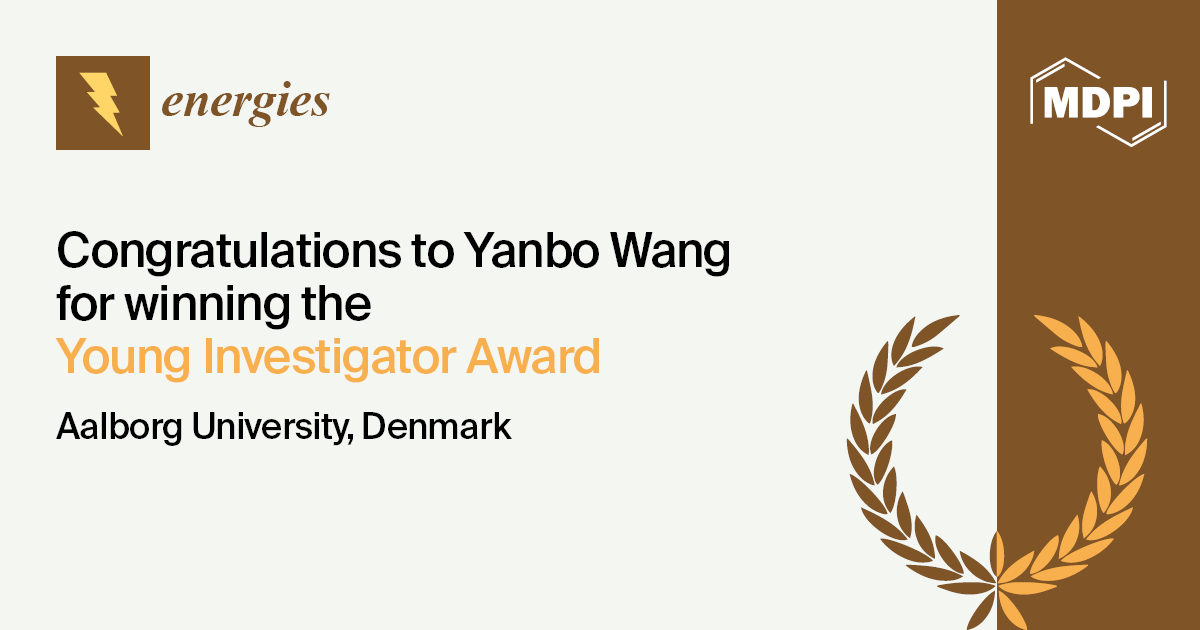
Interview with Dr. Yanbo Wang—Winner of the Energies 2024 Young Investigator Award
Name: Dr. Yanbo Wang
Affiliation: Department of AAU Energy, Aalborg University, 9000 Aalborg, Denmark
Research interests: integrated energy system; microgrid; wind power system; power to X technology
The Energies Young Investigator Award was established in 2017 to acknowledge the achievements of young investigators in the field of energy. The winner is chosen by the journal’s award committee.
Let us hear his opinions and find out about his experiences in scientific research and awards.
Could you briefly introduce yourself to our readers and tell us a little bit about your fields of interest?
My name is Yanbo Wang, and I am currently an Associate Professor at the Department of Energy Technology at Aalborg University in Denmark. My research focuses primarily on power-electronic-dominated power systems and renewable energy technologies. This includes areas such as microgrids, the modeling and control of power-electronic generators, and integrated energy systems. I am also deeply involved in research on electrified transportation systems. My work aims to support the development of sustainable and intelligent energy infrastructures, and I’m passionate about exploring how different disciplines intersect within the broader field of renewable energy.
Could you elaborate on how you initially learned about the Energies journal? Furthermore, what inspired you to apply for the Energies Young Investigator Award 2024?
I first became involved with the Energies journal through my work as a Guest Editor, where I organized several Special Issues on topics closely related to my research. That role allowed me to collaborate with scholars from around the world and helped me see how valuable the journal is for disseminating new ideas in the field. I’ve also submitted review papers to the journal and benefited from its open and collaborative environment. These experiences inspired me to apply for the Energies Young Investigator Award. I view Energies as not just a publication, but a strong international platform where researchers can share their latest findings and build lasting academic networks.
What is the secret to a happy scientific life? Have you ever encountered any difficulties conducting research and how did you overcome them?
That’s a great question. In science, we constantly face challenges—whether it's in developing new technologies or pushing the boundaries of what we know. I believe the key to a fulfilling scientific life is persistence, curiosity, and a strong belief in the value of your work. I always try to stay confident and ambitious, aiming for original ideas rather than simply following what others have done. When I face difficulties, I return to the fundamentals—conducting basic experiments, running simulations, and most importantly, continuing to learn. I believe it’s essential to have a multidisciplinary perspective. Although my expertise is in renewable energy, I also study related fields like materials science, mechanics, and thermal systems. This broader knowledge base helps me address complex challenges more effectively.
What is your opinion of the open access model of publishing?
I think open access publishing offers an excellent opportunity to share our work with the global research community. At Aalborg University, we have strong collaborations with open access journals like Energies, and I see the benefits clearly. Publishing in open access not only helps others learn from our work, but it also allows us to reflect and summarize our own contributions through review papers. I’ve found it very rewarding—both professionally and intellectually. Open access journals also make it easier to stay updated with the latest developments from peers around the world. It's a powerful model for accelerating the exchange of knowledge.
Do you have any advice for aspiring young researchers looking to make a meaningful impact in their respective fields?
Yes, I do. Renewable energy is a highly dynamic and interdisciplinary field. I encourage young researchers to broaden their horizons and not limit themselves to just one area like electrical engineering. The future of energy systems involves a mix of technologies—hydrogen, thermal systems, mechanical engineering, and more. You need to build knowledge across fields to make real progress. Also, think beyond academia—consider how your research can be applied in real-world engineering contexts. That’s how you ensure your innovations can truly make an impact. I also recommend building strong academic networks through international conferences, collaborative projects, and organizing Special Issues in journals like Energies. That has helped me a lot in establishing meaningful collaborations with top scholars.
As the winner of this award, is there something you would like to express to our readers?
I am truly honored to receive the Energies Young Investigator Award. It’s a major encouragement for me and reinforces my motivation to contribute further to this exciting field. I want to sincerely thank the Energies journal for this recognition—it means a great deal to me in my academic career. I would also like to encourage readers to be bold in exploring innovative technologies. Renewable energy is not just a hot topic—it’s the future. Under the global push for low-carbon development, all countries are seeking green solutions. This creates great opportunities for researchers and professionals alike. Let’s work together to advance green and renewable energy technologies and make meaningful contributions to a sustainable future.
